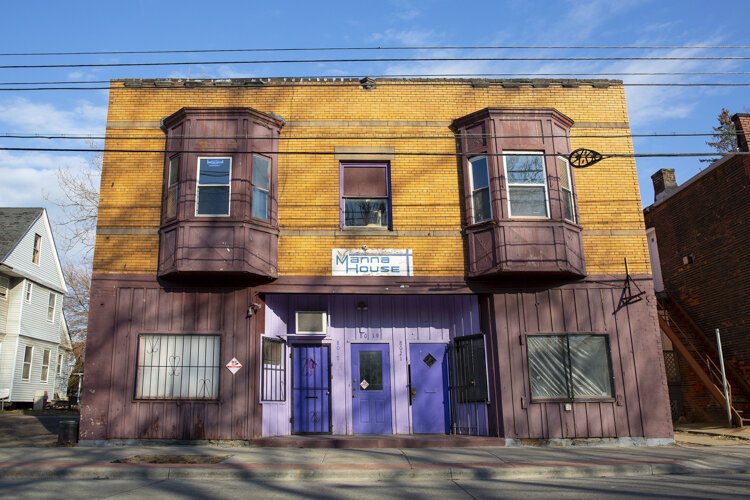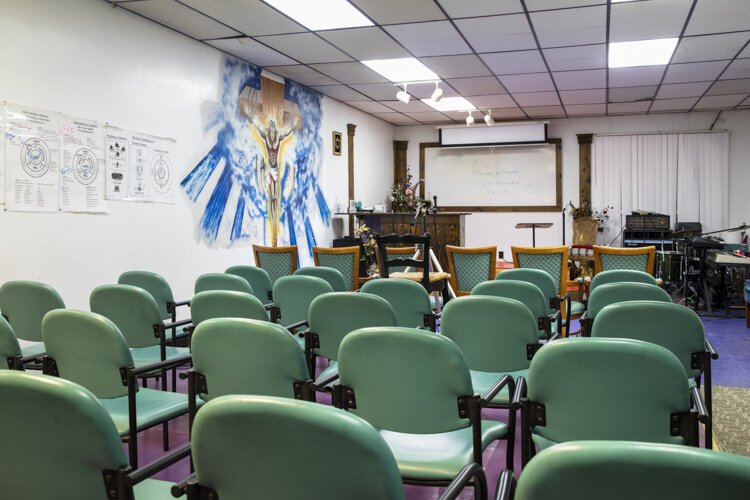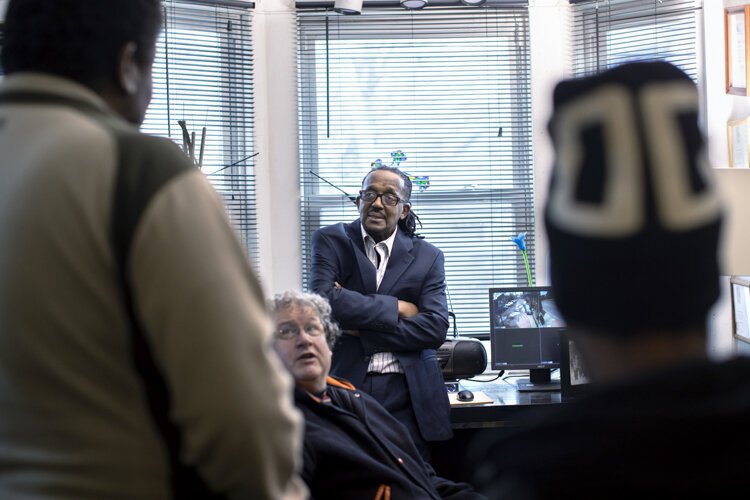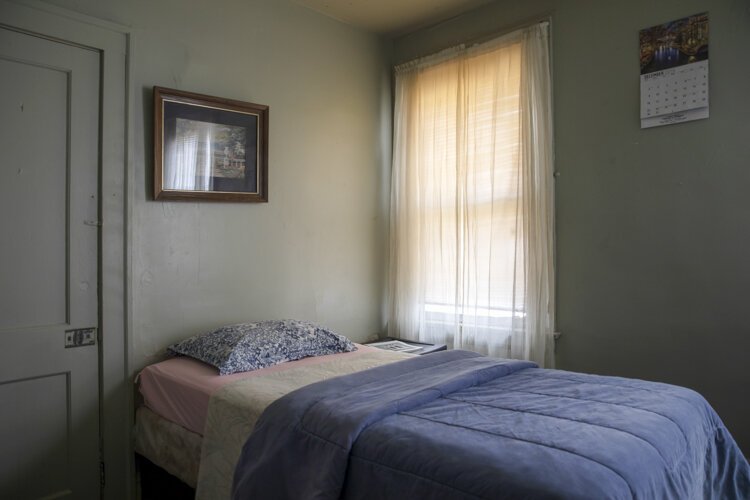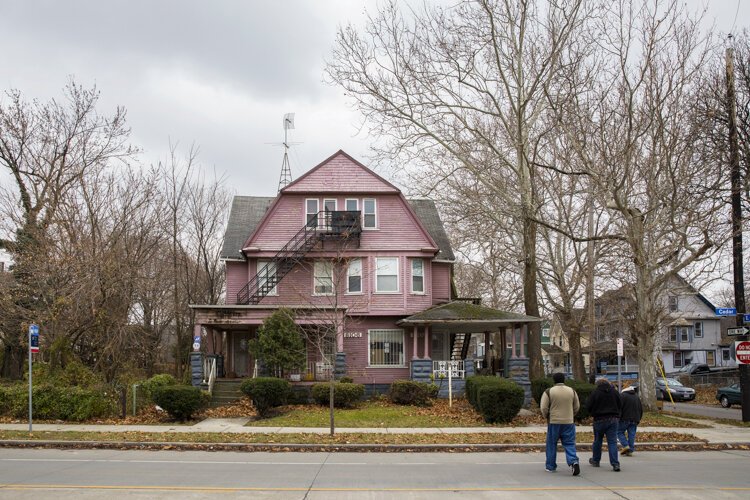Caring and sharing: Manna House offers safety and services in Fairfax neighborhood
There is a place in Cleveland’s Fairfax neighborhood where those in need can find help with recovery at no cost. Founded in 1992 by Rev. Franklin Smith and his wife, Gwendolyn, the Manna House sees 50 to 60 people every day who come to receive services and attend meetings.
“We want the Manna House to be a welcome and safe place in the community,” Smith says. “Sometimes warmth is enough to inspire someone to keep going. Anyone can come in and have a place to sit down, even a cup of coffee at no charge. They don’t even have to attend a meeting.”
The Manna House, 8019 Cedar Ave., offers a variety of services, including pre-marital counseling, anger management, relapse prevention and mentoring.
Smith’s approach stems from his personal experience. He grew up in the church. His father was the pastor of West End Hills Missionary Baptist Church in Birmingham, Alabama, not far from the 16th Street Baptist Church, which white supremacists bombed in 1963, killing four little black girls.
Spirituality has been a part of his life, Smith says. “Around the age of 16, I got on the wrong path,” he says. “I know how easy it is, and I know how important it is to have accessible help.”
Growing up in the South during the 1960s in one of the nation's most rigidly segregated cities, Smith learned about facing hardships firsthand. Eventually, he headed north to Detroit, where he became entangled in street life.
 Rev. Franklin Smith and his wife, Gwendolyn, founded the Manna House in 1992.“That's when I got involved with gangs, and gang violence, and drugs. But the biblical teaching and principles never left me,” he says. “Being a gang leader in Detroit, I found it was the same core principles as discipleship: loyalty, trust, commitment, dedication.”
Rev. Franklin Smith and his wife, Gwendolyn, founded the Manna House in 1992.“That's when I got involved with gangs, and gang violence, and drugs. But the biblical teaching and principles never left me,” he says. “Being a gang leader in Detroit, I found it was the same core principles as discipleship: loyalty, trust, commitment, dedication.”
He also saw that segregation fostered a sense of community that he felt was missing when he moved up North. Smith’s passion for caring for others is his true calling, he says. He serves his community in many ways, from helping people through recovery to creating drug-free zones in Fairfax by taking abandoned houses that once were sites for drug distribution, renovating them, and transforming them into residences.
Smith hopes to re-establish the caring and sharing he grew up with in Alabama. “When I came to the ministry, that's what we called 'Putting the neighbor back in the hood.' Cause once all the neighbors are gone, all you got is the 'hood.”
He got his bachelor’s degree from Temple Bible College in Cleveland. “My pastor was Rev. Sterling Glover. I spent 15 years studying under him.” He cites Glover as his mentor and inspiration. Smith also holds master’s and doctorate degrees from the Institute for Christian Works in Columbia, South Carolina.
The support offered by the Manna House staff makes their services unique, say those who have participated in the programs.
Right place if you’re ready
Gwen R. had just gotten out of jail when she discovered the Manna House. She didn't have a smooth road to recovery in the beginning, she says.
“I needed a place to fulfill the court-ordered community service hours, and the Manna House was right in the neighborhood. I did the court-required time and meetings at the Manna House but ended up staying away for nine months and ended up going back to my previous habits,” Gwen says.
“If you want help, you can get it. You just have to be ready, because if you aren’t, it isn’t going to work for you,” she says. “I came back because I knew that they had the information and the support I truly needed to get my life right. The Manna House offers unconditional love—I continue to go back regularly. I’ve been sober for 18 years. I’m even a counselor now myself.”
Apart from the big lifestyle change, Gwen also found lifelong friendship and even love at the Manna House. She met her future husband there at an AA meeting.
The Manna House offers many options for recovery: meetings throughout the day for support; residential housing; the Twelve Steps program; and meals for the Fairfax community, served each Sunday after church. Eighty to 100 people visit their food pantry every third Saturday. They also deliver food to a list of people in need every Thursday. And they make emergency food deliveries to people who call 2-1-1 asking for help.
Smith sees his ministry as an agency of change. “We do the food pantry, counseling, and sober living housing. We have people going in working in prisons.”
Eight people live in the sober house, Smith says. “Everyone working at Manna House also has the lifestyle of recovery. “ His wife runs the show, he says.
Hard to seek help
Another client, who wishes to remain anonymous, says she struggled with substances for 15 years before seeking help.
“I heard of the Manna House through word of mouth,” she says. “The hardest part about seeking help was surrendering. It was hard to admit defeat. I was unemployed at the time; I wasn’t in school. I would spend my mornings in the Manna House.”
The experience turned her around, she says. “The programs they offer gave support and foundation for me to pursue things I couldn’t even imagine doing. Since the program, my life looks tremendously different. I’m happy, I’m productive—I’m even working on my fifth degree. I oversee two residential facilities.”
Without the Manna House, she truly feels she would be dead. Her life looks completely different now, she says, and the Manna House gave her a safe place to grow.
She recalled the process of recovery that led her to where she is now. In the beginning, she would spend her time between meetings in the basement of the Manna House doing work for her degree, and then she would return upstairs to attend her programs.
“I have done things that I never thought I would be capable of,” she says. “There is hope—we hear a lot about tragedies. In order for change to take place, we need supportive people in the community like Pastor Frank and his wife. We need a place to go without judgment, with love—food and warmth. We need the Manna House.”
 Angelina, a member of the Manna House team, talks with two men who stopped at Manna House to inquire about getting help.Carrying on
Angelina, a member of the Manna House team, talks with two men who stopped at Manna House to inquire about getting help.Carrying on
Smith has done amazing things for the Fairfax community and continues to help others. However, supporting the Manna House with his own money limits what he can do for the people he cares so much about.
“If we had the money, we would get more staff to facilitate more programs,” he said. “We would also benefit from having staff for upkeep and our parking lot paved.”
Smith, who has been sober since 1991, motioned somberly toward his office. An entire wall is covered in books, while his diplomas and certificates hang on another.
“Of course, I think about retiring from time to time, but never about stopping what’s happening here. I want the Manna House to outlive me. I want it to be here for a long time,” he says. “My biggest hope is that there is someone younger who will continue to offer help to those in need in this community—without feeling the need to charge.”
More information about Manna House can be found on their website, by giving them a call at 216-432-2598, or by simply walking in, because all are welcome.
Elle Wilson is part of the Fairfax Correspondent program, designed to lift up residents’ voices by encouraging and developing neighborhood residents to become storytellers.

